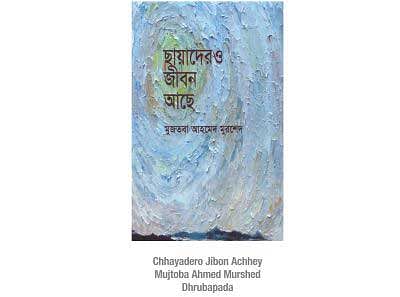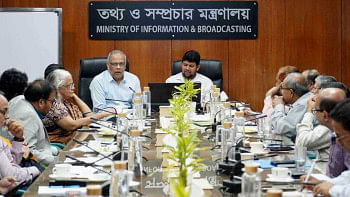Poetry powered by nostalgia and reverie

'A poet is a man speaking to men', the most quoted and solemn definition of poetry by William Wordsworth, was the only line I was recollecting while going through the poems in the latest collection of Mujtoba Ahmed Murshed titled Chhayadero Jibon Achhey. Of course, there lie some relevant reasons for recollecting the axiom. Firstly, there is Murshed's facile diction and, secondly, there is the conversational tone of his poems. As a poet of the 1990s Mujtoba Murshed has been ably developing a reader-friendly diction for his poetry that is completely his own. He generally says directly what he intends to say. Therefore, there are few symbols in his poetry. But it is also true in the case of a poet that he/she can never compose poetry without symbols. Consequently a poet subconsciously uses some symbols in which the inner themes are expressed in subtle manner. Murshed is also enslaved to his subconscious or unconscious layer of mind. Nonetheless he is not much interested in making his poems intensely symbolic.
Chhayedero Jibon Achhey includes forty four poems in which readers will find a great variety of subjects being dealt with, such as the poet's favourite personalities, happenings in everyday life, memories of the past, love-haunted moments and so on. However. the poet comes across as nostalgic in many of the poems in this volume. It becomes crystal clear from this collection that he has a tendency to slip away from following the conventional forms of poetry. Needless to say, such an inclination on Murshed's part proves he loves to experiment in the forms of poetry. Amid the poems in this collection, there are some haiku-like poems. In conventional sense, though, these are not haikus. But because of their length and rhythm, they can be looked upon as haiku. It goes without saying, though, that these tiny poems bear very grave and meanings which we do not normally find in short-length poems of a shorter length. And I simply assert that readers can easily be flabbergasted by reading those short-length poems, which I believe have a chance of living long.
Now, let me travel into the realm of his poetry. The collection opens with the poem, Chhayar Jibon (Shade's Life) which delineates how shades, being de-linked from bodies, perform various types of activities, similar to the activities of human beings. Consequently the poet composes:
Shadows have minds
They also love
Being intensely passionate they go deep down into the water of the oblong lake
They also laugh……..shadows have life too.
While translating the lines I did not follow their chronological order. I have merely skimmed through the lines to provide the readers a glimpse of the poem. How Murshed became so nostalgic while weaving a good number of poems is proved through such compositions such as Purono Thikana (The Previous Address), Roddure Station (The Station Blazing with Sunlight), Shesh Busta-o Phirbe (The Last Bus Will Also Come Back), Jonmodin (Birthday) and so on. Sometimes we find Murshed as a stern escapist when we browse the poem Shob Sheshe Shopnoi Shotti (At the End Dream is True) in which he is assailed by doubts and says what he sees today might be unseen tomorrow. Eventually he keeps his faith in dreams which he thinks are true.
Thus his romantic vision comes to the fore through some of his poems. He has also penned a number of poems in the memory of some of his favourite personalities, namely, Bangabandhu Sheikh Mujibur Rahman, poet Mahbubul Alam Choudhury, and Che Guevara. Again he clarifies his philosophical standpoint in a number of poems such as Jibon, Vabhnar Chorachor, Noishobdamakha Shobdoguchcho, etc.
Mujtoba Murshed has a wonderful poem regarding Banalata Sen. Through this poem, the most celebrated character, Banalata Sen, created by Jibanananda Das seeks to come out of darkness because she has passed ages in it sitting face to face. Now she desires to be bathed in sunlight. Mujtoba Murshed dramatically presents this character. Here are a couple of lines translated for readers to make out his dramatization:
All of a sudden
Banalata calls with her sweet voice………..Jibanananda
I am that girl of yours, Banalata Sen
I desire to be happy singing the song of humanity
Mujtoba Ahmed Murshed's poetry is enmeshed in dream-like thoughts which take us to his self-made world. His poetry, without any distortion, encapsulates a moral vision which helps us find an ideal world free of all kinds of anxieties and fears. And undoubtedly, most of the thoughts in his poetry have that soothing power to refresh us. He regales us with his most impressive style of verse making. To sum up Murshed's poetry, the very beginning lines from Adrienne Rich's famous poem Our Whole Life ought to suffice:
Our whole life a translation
the permissible fibs…

 For all latest news, follow The Daily Star's Google News channel.
For all latest news, follow The Daily Star's Google News channel. 



Comments